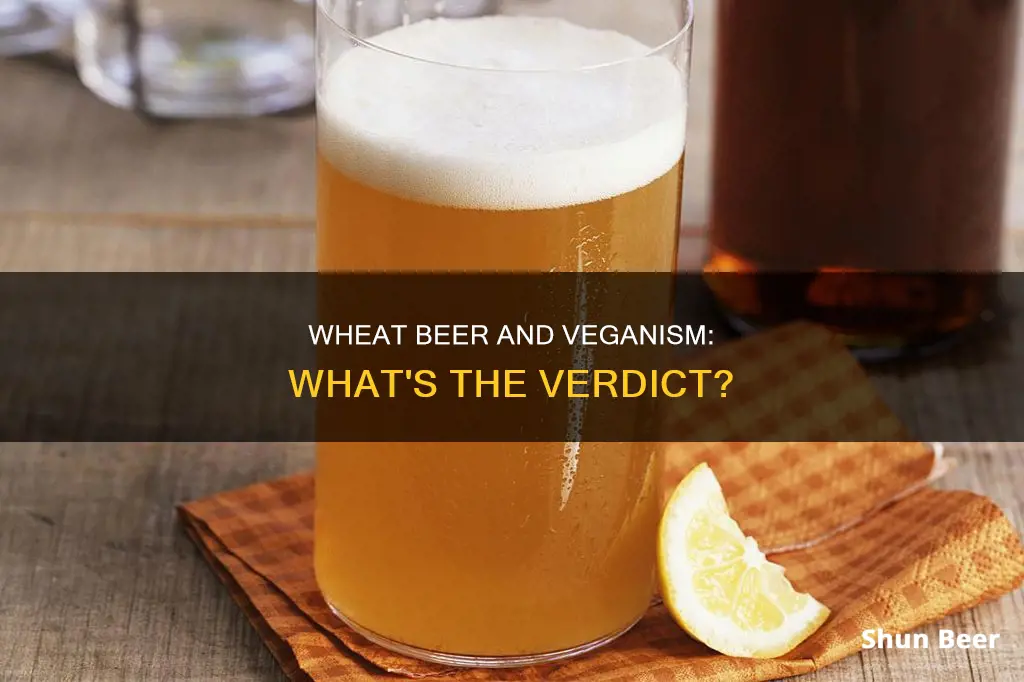
Wheat beer is a popular beverage choice, but is it vegan-friendly? The answer may surprise you. While wheat beer is often made from plant-based ingredients like barley malt, water, hops, and yeast, some breweries use animal products in the filtration process, making their wheat beer non-vegan. These animal-based ingredients, such as gelatin and isinglass, are used to clarify and refine the beer. Isinglass, for example, is derived from the dried bladders of fish and has been used since the 19th century to remove yeast and sediment, giving the beer a clear appearance. However, modern technology has introduced alternative filtering techniques that do not rely on animal products, and some brewers simply leave the debris from yeast and grain, which some argue adds flavor. So, when it comes to wheat beer, it's important for vegans to be vigilant and choose brands that use vegan-friendly filtration methods.
What You'll Learn
- Wheat beer is often not vegan due to the use of animal products in the filtration process
- Animal-derived ingredients used in wheat beer include gelatin and isinglass
- Isinglass is made from the dried swim bladders of fish and is used to remove yeast and sediment
- Some modern breweries use alternative filtration techniques, such as centrifuges, to produce vegan wheat beer
- Examples of vegan wheat beers include Samuel Smith's Organic Wheat Beer and North Coast Blue Star Wheat Beer

Wheat beer is often not vegan due to the use of animal products in the filtration process
The fining process is used to remove impurities from the beer, leaving it clear, clean, and smooth. Some brewers use animal products as fining agents, including isinglass, gelatin, milk protein, and egg extracts. Isinglass, for example, is made from the dried swim bladders of sturgeon and other fish. While these finings are meant to settle out of the beer before it is consumed, this is not guaranteed, and the beer cannot be considered vegan if they are used.
Some brewers have started using vegan-friendly fining agents, such as Irish moss, a type of carrageenan seaweed. Other methods for achieving clear beer include filtration, centrifugation, or simply allowing the beer to settle naturally for a longer period.
While most major beer brands produce vegan-friendly beer, it can be difficult to determine which beers are vegan, as this information is not always disclosed on the packaging. Some resources, such as Barnivore.com, provide lists of vegan beers, and larger brewers generally avoid using animal products, a trend that is expected to increase in the future.
Wheat Beer and Lager: What's the Difference?
You may want to see also

Animal-derived ingredients used in wheat beer include gelatin and isinglass
Wheat beer is a style of beer that is typically brewed with a large proportion of wheat, in conjunction with malted barley. While wheat beer may seem vegan-friendly, many breweries use animal products during the brewing process.
Breweries may also use animal products for head retention, flavour, and colouring. Honey, lactose, and milk chocolate are examples of animal-derived ingredients that may be listed on beer labels. However, it is the animal products used in smaller proportions that are often not disclosed on labels, making it challenging for consumers to identify them.
To ensure that a wheat beer is vegan-friendly, it is advisable to contact the brewery directly or refer to reliable online resources that provide information on vegan beers.
Wheat Beer's Sweet Escape From Bitterness
You may want to see also

Isinglass is made from the dried swim bladders of fish and is used to remove yeast and sediment
Wheat beer can be vegan, but it depends on the brand and its ingredients. Some wheat beers are vegan-friendly, while others may contain animal products or be processed using animal-based agents.
One such animal-based agent is isinglass, which is made from the dried swim bladders of fish. The word "isinglass" comes from the German and Dutch words for "sturgeon bladder." It is a form of collagen, and the bladders are removed from the fish, processed, dried, and formed into various shapes.
Isinglass has been used for centuries as a fining or clarifying agent in alcoholic beverages, including beer and wine. It is particularly effective in removing yeast and other sediments from the brewing process, accelerating the natural clarification that occurs over time. The isinglass finings cause the yeast to flocculate into a jelly-like mass, which then settles at the bottom of the cask, leaving the beer clear and cloud-free.
While isinglass has been a traditional method for clarifying beer, some consider it unappealing or unsuitable for certain diets, such as veganism and vegetarianism. There has been a growing demand for vegetarian-friendly beers, and brewers are exploring alternative fining agents, such as Irish moss (a type of red algae). These alternatives not only meet consumer preferences but also address concerns about the sustainability and ethics of using fish bladders.
Fat Tire Beer: Wheat-Free or Not?
You may want to see also

Some modern breweries use alternative filtration techniques, such as centrifuges, to produce vegan wheat beer
Wheat beer is not always vegan. While the main ingredients in beer are plant-based, some breweries use animal-derived fining agents to clarify and stabilise their beer. These agents can include gelatin, isinglass, casein, or chitosan. However, some modern breweries are using alternative filtration techniques to produce vegan wheat beer.
One such technique is centrifugation, which involves rapidly rotating the fermented beer in a centrifuge bowl. This process forces solids such as yeast, proteins, and hops debris to the bottom and outer discharge chamber, while the remaining liquid avoids oxygen and flows through an outlet. Centrifugation has several benefits for breweries. Firstly, it improves the yield of a batch by reducing beer loss compared to other filtration methods. Secondly, it allows breweries to turn over tanks quicker, improving efficiency. Finally, some brewers claim that centrifugation enhances the aroma and flavour of their beer.
Centrifuges can be expensive, with costs ranging from $80,000 to $1 million. As a result, smaller breweries may opt for more cost-effective filtration methods such as surface filtration or cake filtration. Surface filtration uses filter sheets or cartridges with minuscule pores to trap and retain particles, allowing clear beer to pass through. Cake filtration, on the other hand, involves building up a "cake" of filter aid, such as diatomaceous earth, on the surface of a filter screen to trap particles as the beer passes through.
Another alternative filtration technique is cold filtering, which involves chilling the beer to near-freezing temperatures. This causes haze-causing proteins and polyphenols to clump together and settle out, after which the beer is passed through a filter to remove these larger particles. While this method is popular among larger breweries due to its effectiveness and scalability, it may remove some flavour compounds, resulting in a less complex taste profile.
Some breweries also use vegan-friendly fining agents, such as Biofine, which helps separate solids from beer in 2 to 3 days. This agent is particularly suitable for pale ales and India pale ales. Additionally, some breweries are experimenting with new vegan ingredients, such as "chiber," a white button mushroom fiber that can clarify beer and leave residual antimicrobial benefits.
Wheat Beer's Acidity: What's the Truth?
You may want to see also

Examples of vegan wheat beers include Samuel Smith's Organic Wheat Beer and North Coast Blue Star Wheat Beer
Wheat beer is a style of beer that is typically vegan, as it is brewed with wheat malt, hops, yeast, and water. However, some wheat beers may use animal-derived fining agents, such as isinglass (from fish bladders) or gelatin (from hooves), which are used to clarify the beer and remove impurities. These agents are not always listed on the label, so it can be difficult to determine if a wheat beer is vegan-friendly. That being said, there are some wheat beers that are widely considered to be vegan, and two examples are Samuel Smith's Organic Wheat Beer and North Coast Blue Star Wheat Beer.
Samuel Smith's Organic Wheat Beer is a vegan-friendly option produced by the Samuel Smith Brewery in Tadcaster, England. The brewery has a long history, dating back to 1758, and it still uses traditional brewing methods, such as fermenting ales and stouts in stone 'squares' made from slate blocks. Their organic wheat beer is unfiltered and has a champagne-like fizz, with citrus and banana flavours. It pairs well with a slice of lemon and is best served chilled.
North Coast Brewing Co.'s Blue Star Wheat Beer is another vegan-friendly option. This American wheat beer is brewed with a combination of choice American barley and wheat malts, along with a blend of noble hops, resulting in a light, fruity, and refreshing beer. It is unfiltered, with yeast adding a complex note to its flavour profile. Blue Star has won multiple awards at the World Beer Championships in Chicago, from 2001 to 2005.
In addition to these two examples, there are several other vegan-friendly wheat beers available, including those from Anderson Valley Brewing Company, Golden Road Brewing, and Goose Island Beer Company, among others.
Wheat Beers: Heavy, Bitter, or Both?
You may want to see also
Frequently asked questions
Some breweries use animal products like gelatin and isinglass, which is made from fish bladders, in their filtration process.
Contact the brewery directly to ask about their ingredients and conditioning methods. Barnivore.com is a searchable index of vegan alcohol, and some breweries put their vegan status on their website.
Samuel Smith's Organic Wheat Beer, North Coast Blue Star Wheat Beer, and Hawkshead Great White Wheat Beer.
Pitchfork Brewing Co.'s Honey Wheat Beer, Beach Haus Herb's Rye American Wheat Beer, and Boscos Honey Wheat Beer.
Guinness Extra Stout, Newcastle, and Rogue Ales' Mad Cow Milk Stout.







